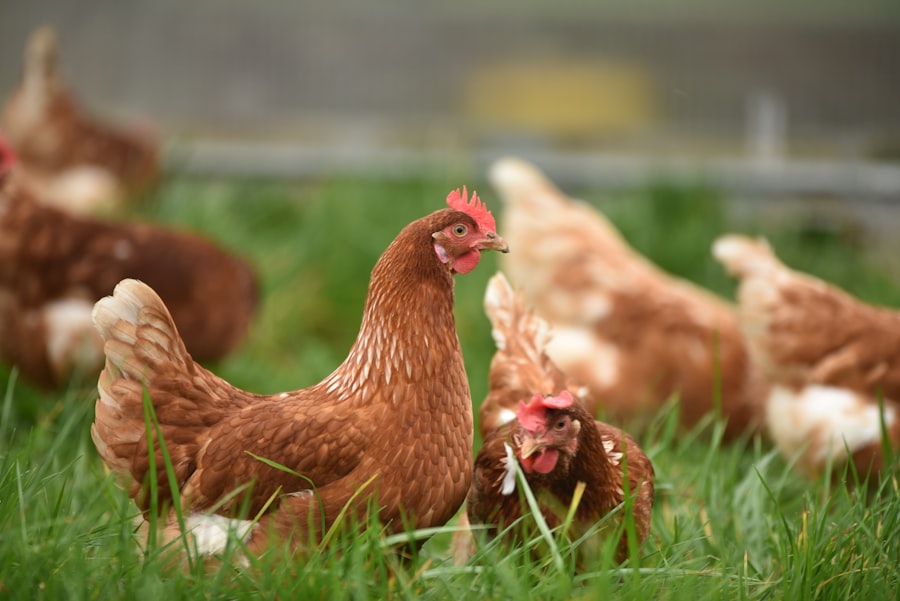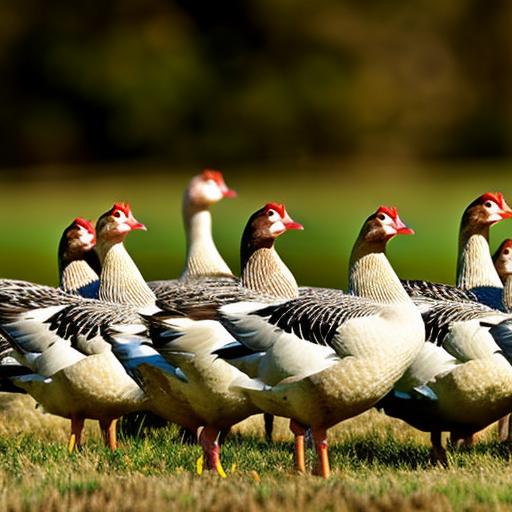Keeping geese and chickens together is a popular practice among many poultry enthusiasts. Not only does it provide a unique and diverse flock, but it also offers several benefits for both the geese and the chickens. By cohabitating, these two species can help each other with pest control, fertilization, and even companionship. In this article, we will explore the benefits of keeping geese and chickens together, understand their nature and behaviors, discuss the right breeds for cohabitation, provide tips on creating a suitable living space, and offer guidance on feeding and maintaining a clean environment for them.
Key Takeaways
- Keeping geese and chickens together can provide benefits such as pest control, egg production, and meat production.
- Understanding the nature of geese and chickens is important for successful cohabitation, as geese can be territorial and aggressive.
- Choosing the right breeds of geese and chickens is crucial, as some breeds may not be compatible or may have different needs.
- Providing adequate space for geese and chickens is essential for their health and well-being, as they require different amounts of space and access to water.
- Designing and building a chicken coop for geese and chickens requires careful consideration of their needs and behaviors, and maintaining a clean and safe environment is crucial for their health.
The Benefits of Keeping Geese and Chickens Together
One of the main benefits of keeping geese and chickens together is their ability to benefit each other. Geese are known for their excellent pest control skills. They are natural grazers and will happily munch on grass, weeds, and insects. By allowing geese to roam freely with chickens, they can help control pests in the area. Chickens, on the other hand, are excellent at scratching the ground and turning it over. This behavior helps to aerate the soil and expose pests for the geese to eat.
Another benefit of keeping geese and chickens together is fertilization. Geese produce large amounts of manure, which is rich in nutrients. When they share a living space with chickens, their manure can be spread evenly across the area. Chickens will scratch through the manure, helping to break it down and distribute it throughout the soil. This natural fertilization process can greatly improve the health of the soil and promote better plant growth.
Understanding the Nature of Geese and Chickens
Geese and chickens have different behaviors and habits that need to be understood in order to successfully keep them together. Geese are social animals that thrive in groups. They are highly protective of their flock and will often act as guardians, alerting the group to any potential threats. Geese are also known for their honking, which can be quite loud and may not be suitable for all environments.
Chickens, on the other hand, are more independent and can be kept in smaller groups or even individually. They are known for their scratching behavior, which helps them find food and create dust baths. Chickens also have a pecking order within their flock, which can sometimes lead to aggression or bullying.
Choosing the Right Breeds of Geese and Chickens
When it comes to choosing the right breeds of geese and chickens to keep together, it is important to consider their compatibility. Some breeds of geese may be more aggressive or territorial, which can cause issues when cohabitating with chickens. It is best to choose geese breeds that are known for their calm and friendly nature, such as Toulouse or Embden geese.
For chickens, breeds that are more docile and less likely to be aggressive towards geese are ideal. Some suitable chicken breeds include Orpingtons, Sussex, or Australorps. It is important to research the specific characteristics and temperaments of different breeds before making a decision.
Providing Adequate Space for Geese and Chickens
Geese and chickens require different amounts of space to thrive. Geese need more room to roam and graze compared to chickens. As a general rule of thumb, provide at least 20 square feet per goose and 4 square feet per chicken in an outdoor area. This will ensure that they have enough space to move around comfortably.
It is also important to create a safe and comfortable environment for both geese and chickens. This includes providing shelter from the elements, such as a coop or shed, as well as access to fresh water and shade. The outdoor area should be securely fenced to protect them from predators.
Designing a Chicken Coop for Geese and Chickens

Designing a coop that is suitable for both geese and chickens requires careful planning. The coop should have separate areas for nesting and roosting, as well as enough space for both species to move around comfortably. It is also important to provide adequate ventilation to prevent the buildup of moisture and ammonia.
When it comes to materials, choose sturdy and predator-proof materials such as wood or metal. The layout of the coop should allow for easy cleaning and maintenance. Consider adding ramps or steps to accommodate the geese, as they may have difficulty navigating steep inclines.
Building a Chicken Coop for Geese and Chickens
Building a coop for geese and chickens can be a rewarding DIY project. Start by gathering all the necessary materials, including lumber, hardware, and fencing. Follow a detailed plan or blueprint to ensure that the coop is built correctly.
Begin by constructing the frame of the coop, making sure to include separate areas for nesting and roosting. Install windows or vents for ventilation, and add doors for easy access. Use wire mesh or fencing to enclose the outdoor area, ensuring that it is secure and predator-proof.
Maintaining a Clean and Safe Environment for Geese and Chickens
Maintaining a clean environment is crucial for the health and well-being of geese and chickens. Regularly clean out the coop, removing any soiled bedding or manure. This will help prevent the buildup of bacteria and parasites.
Provide fresh water daily and ensure that it is easily accessible to both geese and chickens. Regularly check for any signs of illness or injury, and seek veterinary care if necessary. Keep an eye out for any potential hazards in the outdoor area, such as toxic plants or sharp objects.
Feeding and Watering Geese and Chickens Together
Geese and chickens have different dietary needs, but they can be fed and watered together with some adjustments. Geese require a diet that is higher in fiber and lower in protein compared to chickens. They also need access to water for grazing and drinking.
Provide a balanced poultry feed that is suitable for both geese and chickens. Supplement their diet with fresh greens, fruits, and vegetables. Ensure that there are multiple feeding and watering stations to prevent competition and ensure that all birds have access to food and water.
Can You Keep Geese and Chickens Together?
In conclusion, keeping geese and chickens together can be a rewarding experience for poultry enthusiasts. The benefits of cohabitation include pest control, fertilization, and companionship. By understanding the nature of geese and chickens, choosing the right breeds, providing adequate space, designing a suitable coop, maintaining a clean environment, and feeding them appropriately, it is possible to successfully keep geese and chickens together. If you are considering keeping these two species together, do your research, plan carefully, and enjoy the unique dynamics of your diverse flock.
If you’re considering keeping geese with chickens, it’s important to understand the dynamics and potential challenges of this arrangement. One crucial aspect to consider is the design and layout of your chicken coop and run. Poultry Wizard offers a comprehensive article on chicken coop and run plans that can help you create a suitable living space for both geese and chickens. Additionally, ensuring proper insulation in your chicken coop is essential for the well-being of your feathered friends. Poultry Wizard also provides a helpful guide on how to insulate a chicken coop, which can be beneficial when housing geese alongside chickens. For further information on feeding your ducks, Poultry Wizard has an informative article on what you should feed ducks. Check out these valuable resources to ensure a harmonious coexistence between your geese and chickens.
FAQs
Can I keep geese with chickens?
Yes, it is possible to keep geese with chickens. However, there are some things to consider before doing so.
What are the benefits of keeping geese with chickens?
Geese can provide additional protection for chickens against predators such as foxes and raccoons. They can also help keep the coop and surrounding area clean by eating insects and weeds.
What are the potential problems of keeping geese with chickens?
Geese can be aggressive towards chickens, especially during mating season. They may also compete with chickens for food and water. Additionally, geese produce more waste than chickens, which can lead to sanitation issues if not properly managed.
How should I introduce geese to my chicken flock?
It is important to introduce geese slowly and carefully to the chicken flock. Keep them separated at first and gradually allow them to interact under supervision. It may also be helpful to provide separate feeding and watering stations for each species.
What should I feed my geese and chickens?
Geese and chickens have different dietary needs. Geese require a diet higher in protein and lower in calcium than chickens. It is important to provide each species with their own appropriate feed and not to mix them together. Fresh water should also be available at all times for both species.
Meet Walter, the feathered-friend fanatic of Florida! Nestled in the sunshine state, Walter struts through life with his feathered companions, clucking his way to happiness. With a coop that’s fancier than a five-star hotel, he’s the Don Juan of the chicken world. When he’s not teaching his hens to do the cha-cha, you’ll find him in a heated debate with his prized rooster, Sir Clucks-a-Lot. Walter’s poultry passion is no yolk; he’s the sunny-side-up guy you never knew you needed in your flock of friends!







